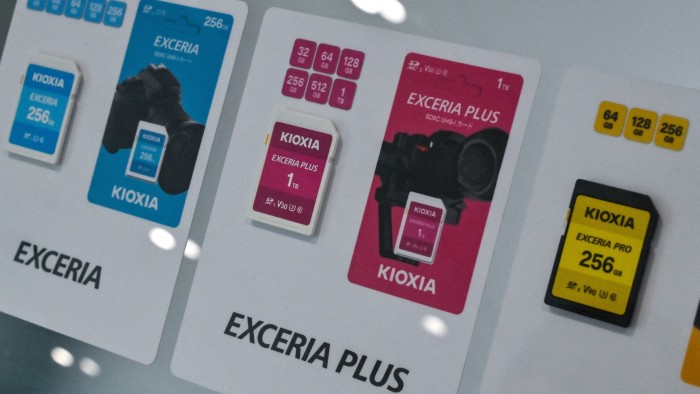Unlock the Editor’s Digest for free
Roula Khalaf, Editor of the FT, selects her favourite stories in this weekly newsletter.
Shares in Japan’s Kioxia rose more than 6 per cent on its first day of trading in Tokyo, with private equity group Bain Capital’s listing of the lossmaking chipmaker finally getting off the ground after previous plans to float the company were aborted and a sale of the business collapsed.
Bain had acquired the former memory chip business of Toshiba in a landmark buyout six years ago. The Japanese conglomerate was in the depths of a financial crisis at the time and the deal was unprecedented in its scale for private equity in Asia, setting the stage for Japan to become the world’s second most active market for private equity after the US.
The initial public offering comes after previous efforts to list were called off in 2020 — knocked off course by the pandemic and rising trade frictions between the US and China over semiconductor technology.
The road to listing has been tumultuous, with efforts to merge Kioxia with rival Western Digital to create a US-Japan memory chip champion falling apart last year.
On Wednesday, the shares had a muted opening at ¥1,440, below the offering price of ¥1,455 and at the lower end of the indicated range, marking a blow to the US private equity group that had been wanting to tap into the buzz around chip and artificial intelligence-related stocks.
The stock price later rallied to trade up 6.4 per cent from the opening price at ¥1,531, giving some relief to an IPO that had been an on-off prospect for some time, due to concerns over the health of the semiconductor market and Bain’s expectations for the valuation.
The market capitalisation of ¥796bn ($5.2bn), for the world’s third-largest maker of flash memory products behind Samsung and SK Group, is a fraction of the $18bn that Bain paid in 2018 and pared back from previous expectations for a valuation as high as $10bn.
Formerly known as Toshiba Memory, Kioxia was a pivotal grab by private equity of prized Japanese assets. Toshiba conducted what was seen as a “fire sale” of its memory business — a component it invented in the 1980s — in the wake of an accounting scandal and financial troubles.
Nand flash memory chips store information in smartphones and data-centre servers, but the market has been hit by sluggish handset sales coming out of the pandemic.
The company’s revenues have shrunk 30 per cent in the past two years to about ¥1tn in the 12 months to March, generating an operating loss of ¥252bn.
Kioxia — combining the Japanese word for “memory” and Greek word for “value” — was only the second listing on the Tokyo Stock Exchange this year whose offer price was not at or above the upper end of the indicative range.
Bain, in common with other global private equity funds, sees Japan as a rich source of deals as companies come under greater pressure from activists and other shareholders to offload non-core businesses and sell off property and other assets.
Until recently, rival funds have avoided direct confrontation with one another over Japanese assets or be perceived as hostile bidders. But Bain is currently locked in an unprecedented tug of war with KKR over Fuji Soft — an IT company which also holds substantial real estate.
Last week, Fuji Soft reaffirmed its approval of a buyout offer from KKR, even though Bain had said it would submit a higher offer. On Wednesday, Bain said it would launch its tender offer without the support of the Fuji Soft board, despite having previously said it would not move ahead without that approval.



